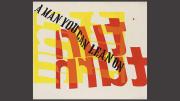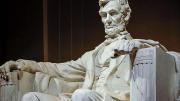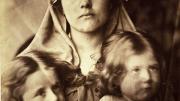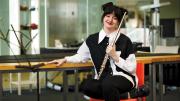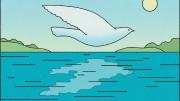Poet and literary figure John Hall Wheelock '08 (1886-1978) was an editor at Charles Scribner's Sons for 46 years, working with Hemingway, Fitzgerald, Wolfe, Santayana, and many other of the Acclaimed. Wheelock dictated an autobiography, an account not only of his life, but of the New York publishing world in an ascendant period. In The Last Romantic: A Poet among Publishers, edited by Matthew J. Bruccoli, with Judith S. Baughman (University of South Carolina Press, $39.95), Wheelock recollects his attempt to gain membership in a Harvard literary society, the Signet.
The Signet initiation I remember distinctly because it was quite overawing to a young man. We had expected — the two other candidates and myself who came in at the same time — that we probably would be subjected (so we were warned) to very drastic physical dangers and horrors of one sort or another. But on the contrary, we came out into this beautifully lighted room, and sitting before us were George Lyman Kittredge, the great scholar; William James, Professor of Psychology at Harvard; Josiah Royce, the philosopher; Hugo Münsterberg, the philosopher, I think also was there; and Charles Townsend Copeland, Boylston Professor of Rhetoric.
Then these men began questioning the candidates, each of whom came out alone. I remember the first question I was asked was by Kittredge, who said, "Spell 'syzygy.'" I couldn't spell it. He then said, "That's spelled S-Y-Z-Y-G-Y." He looked at the other inquisitors and said, "This candidate doesn't seem very promising to me."
Then one of the other professors, I can't remember which one, said to me, "Would you please let us know to which of Longfellow's sisters he addressed that beautiful line, 'Hail to thee, blithe spirit, bird thou never wert.'" And I was confused, because I knew of course that this was from Shelley's "Ode to a Skylark," and it would seem rude to catch a professor in a mistake of that sort, so I had to claim that I wasn't familiar with that, either. Then they looked very doubtful.
Then the third question was: "Could God make rocks bigger than He could lift?" I'd never heard this question before. I have heard since that it's sometimes been used by boys to stump a Sunday school teacher. But there didn't seem to be any answer to that. So I just said I couldn't answer it.
All unanimously agreed — James, Münsterberg, Royce, Kittredge, Copeland, and whoever else was there: "This man is not fit for admission to the Signet. I'm sorry that we've subjected him to this ordeal" and so on. "Next candidate, please." And I retired in the most dreadful state of shame and annoyance. Then, when they'd all listened to and been subjected, I suppose, to the same humiliation, punch bowls were brought in, and I was welcomed with the rest of them as a new member. It was run by students, and these professors were men who had been in the Signet themselves as undergraduates, and it still goes on....
